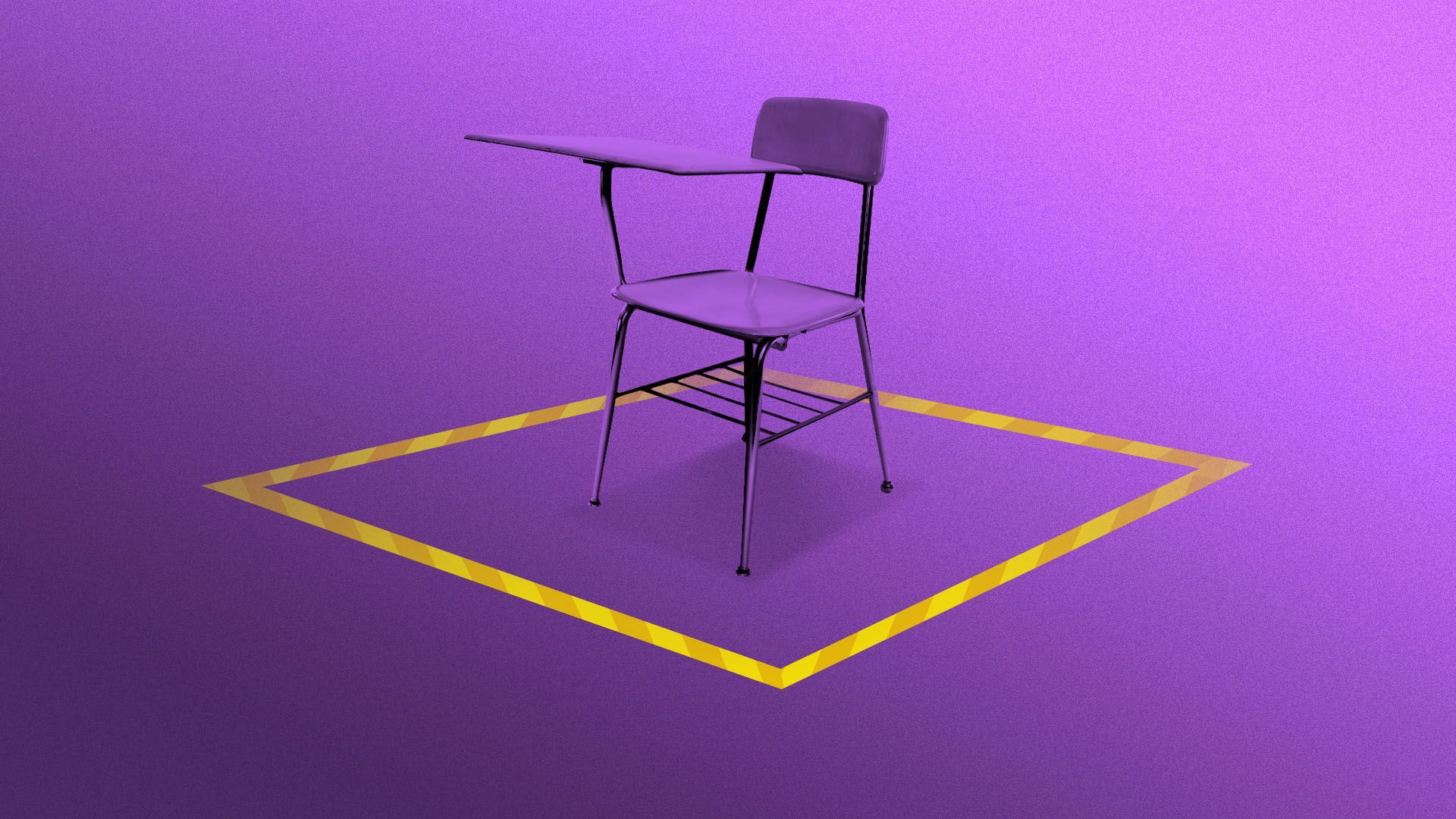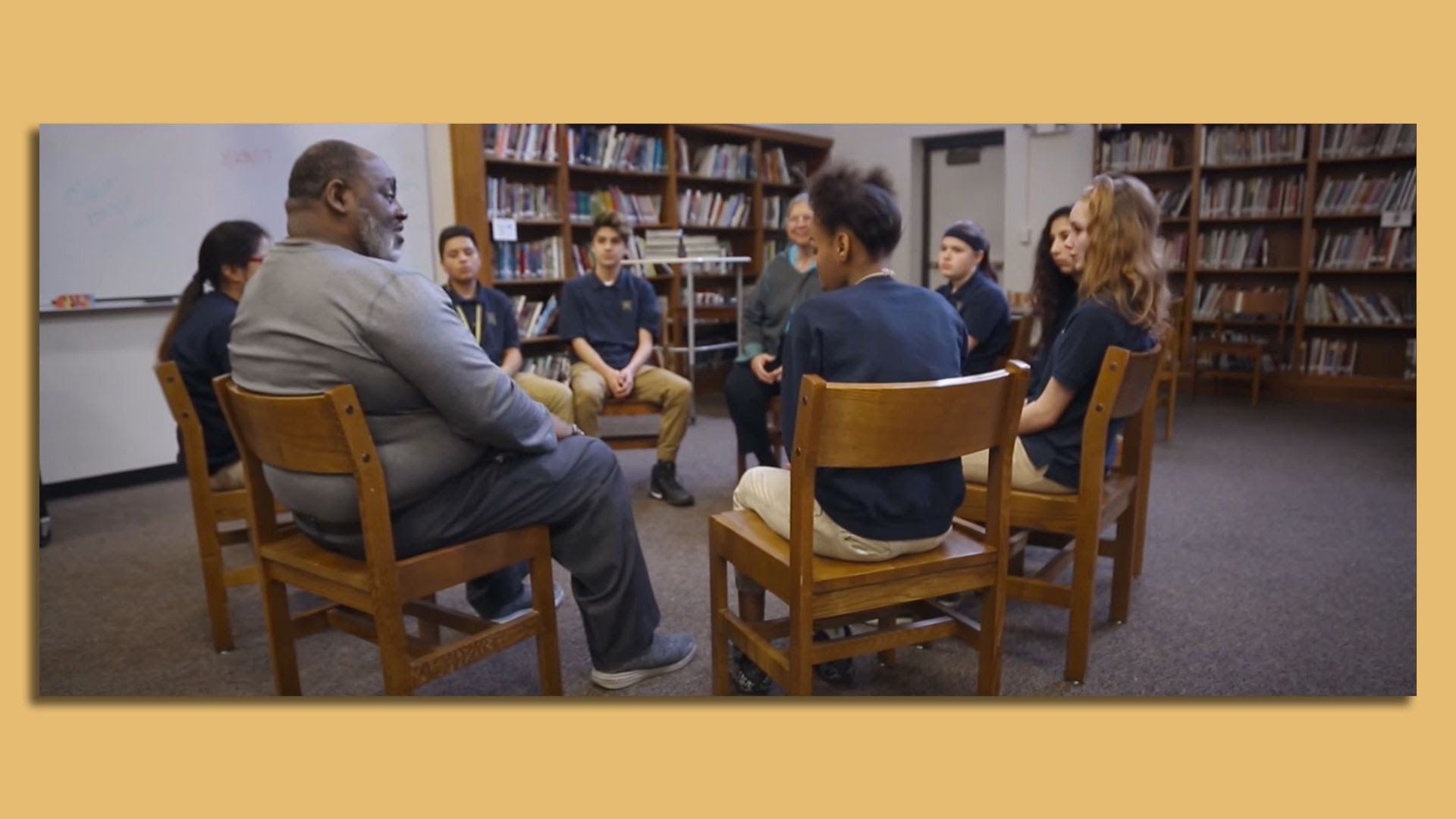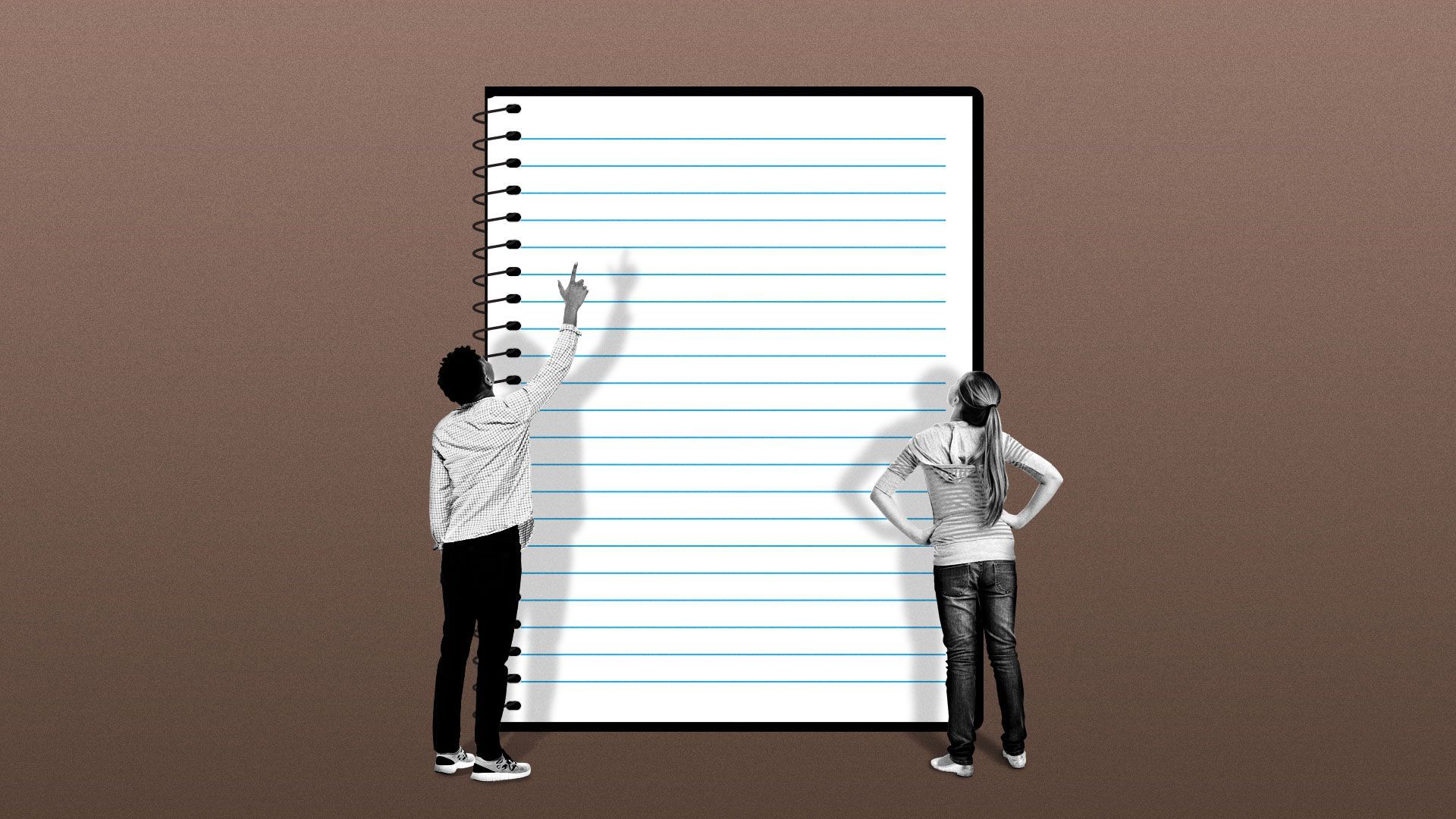Reducing violence in Des Moines Public Schools
Add Axios as your preferred source to
see more of our stories on Google.

Illustration: Sarah Grillo/Axios
Students involved in fights in Des Moines Public Schools are getting pulled from classrooms and shifted to virtual learning under a new policy that launched this school year.
Why it matters: The goal of the district's policy, which has been in effect for nearly four months, is to improve school safety.
- Yes, but: The rules are likely to take more students out of classrooms and increase disciplinary disparities among students of color, says Cheryl Hayes, a juvenile justice reform advocate with A Mid-Iowa Organizing Strategy (AMOS), a network of metro churches and community groups that runs a mediation program in the district.
Catch up quick: The fight policy was implemented in December due in part to "a steady decline in civil discourse" that has influenced student behavior, superintendent Thomas Ahart wrote in his announcement.
- Ahart said restorative practices — those centered on building relationships between those in conflict — remain in place, but that mounting school safety concerns necessitate the policy.
How it works: Students involved in a fight are placed on a behavioral contract, which is considered a chance to address issues that led to the altercation.
- Second and third offenses result in 30- and 60-day virtual learning placement with a third-party provider, rather than the district's own virtual campus.
State of play: Racial disparities in school discipline were already prevalent districtwide prior to the new policy.
- In 2018, Black students accounted for 50% of expulsions, but only made up 18% of the district's student population, per a ProPublica report.
- White students, who made up 42% of the district, accounted for 31% of expulsions. Hispanics, 25% of the population, made up 16%.
- Meanwhile, 35% of out-of-school suspensions involved Black students, 31% white and 20% Hispanic.
Zoom in: As of last week, 50 students have shifted to virtual education this school year because of the new fight policy, Jake Troja, director of school climate transformation for the district, tells Axios.
- All but 10 of them are students of color, including 26 Black students. The majority have returned to in-person instruction at their schools, Troja says.
What they're saying: Hayes tells Axios that virtual schooling environments are not always conducive to learning and the development of healthy socialization skills.
- She says schools should try to keep students in the classroom rather than removing them as a form of discipline.
Of note: Ahart told the school board in a meeting in December that some staff are reluctant to take disciplinary actions for fear that the pattern over time will be perceived as racist.
- The district tracks overall disciplinary disparities, but doesn't specifically evaluate whether certain staffers are disproportionately disciplining students, Troja says.
2. Between the lines: the pandemic factor
New safety approaches, like the fight policy, are being rolled out as schools navigate the aftermath of COVID-19 disruptions, which kept many students out of classrooms for more than a year.
Why it matters: The pandemic has created "uncharted times" that has intensified or made some student behavioral problems more complex, Richard Blonigan, a district administrator of alternative programs, tells Axios.
What's happening: Districts across the nation have reported a spike in behavioral problems linked with the readjustment to in-person schooling.
- Meanwhile, the number of children struggling with mental health issues has risen drastically during the pandemic, Axios' Caitlin Owens reports.
- Teachers, who are already grappling with workforce shortages and burnout, are seeing more anxiety, shorter tempers and prolonged difficulties getting used to new routines among students.
What we're watching: Some schools across the country are opting away from suspensions, and instead prioritizing counseling, to manage the recent rise in student behavioral issues, the Wall Street Journal reports.
- Experts tell Axios that interventions in schools could make a big difference in addressing the mental health crisis among youth.
- "This may be a much easier gateway to mental health care for many young people," Tamar Mendelson, director of the Center for Adolescent Health at the Johns Hopkins Bloomberg School of Public Health, told Axios.
3. Let's Talk tackles conflict through conversation

Des Moines middle schools already have a program in place that focuses on mediation and conversation to address and resolve conflict.
State of play: Community volunteers launched the Let's Talk program in three district middle schools eight years ago with one key objective: fix a system that disproportionately disciplines students of color, Hayes, who's also a coordinator for the program, tells Axios.
- The district has since expanded the program to nearly all of its 12 middle schools.
Catch up fast: Let's Talk is run by AMOS, a network of dozens of metro churches, neighborhood groups and community organizations.
- The program helps students resolve conflicts peacefully, and ultimately aims to disrupt the "school-to-prison pipeline" — the link between punishments and the criminal justice system.
- Inspiration for the restorative justice program came from "The New Jim Crow," a book about the U.S. legal system and how it has led to the mass incarceration of Black men, Hayes says.
What they do: Volunteer mediators, such as retired judges, go into schools to help resolve student conflicts or other disciplinary issues through discussion.
- Oftentimes, mediators help students work through home-life traumas that are a factor in problems surfacing at school, Hayes says.
- Program facilitators also assist with cultural awareness training among district educators to help improve teaching and disciplinary practices.
What they're saying: Hayes says organizers believe Let's Talk is a factor in why disciplinary referrals — generally those involving assaults or weapons — were down in grades 6-8 during the first four months of this school year.
What's next: A research project is ongoing to better assess the project's full impact.
4. Restoration facilitators: DSM's new violence prevention effort

Des Moines Public Schools recently hired a nonprofit to launch a program similar to Let's Talk in its high schools this school year.
State of play: Urban Dreams — a longtime Des Moines nonprofit that advocates for underserved communities — created a restoration facilitator program for high school students.
How it works: Five staffers help students involved in conflicts complete a conference that's intended to diffuse tensions and prevent repeated disciplinary problems.
- The facilitators also mentor students and mediate in small groups.
What they're saying: Blonigan, district administrator of alternative programs, tells Axios the initiative appears to be working, and that the district is conducting ongoing reviews to help strengthen the program.
- Most students who have participated so far have not been involved in other serious disciplinary matters, says Troja, the district's director of school climate transformation.
The bottom line: It'll likely take years to fully assess how policies and programs designed to improve student behaviors will fare in the pandemic era.
Editor's note: This deep dive is a follow-up to an Axios Des Moines story that reviewed what happened in Des Moines Public Schools after the district terminated its school resource officer program.
